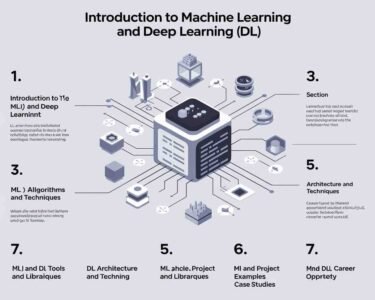Explore upcoming trends in AI and data science

Generative AI
Generative AI Expansion refers to the rapid growth and development of AI systems that can create new content, such as text, images, music, and more. These models, like OpenAI’s GPT-4 and DALL-E, are trained on vast datasets and can generate outputs that mimic human creativity.
The expansion includes improving these models’ accuracy, creativity, and applicability across various industries, such as entertainment, marketing, and education. As these technologies advance, they enable more personalized and automated content creation, transforming how businesses and individuals produce and interact with media.
Quantum computing

Quantum computing is an advanced field of computing that leverages the principles of quantum mechanics to process information in fundamentally different ways from classical computers. Unlike traditional computers that use bits (0s and 1s) for processing, quantum computers use quantum bits, or qubits, which can represent both 0 and 1 simultaneously due to superposition.
This capability allows quantum computers to perform complex calculations at speeds exponentially faster than classical computers, making them potentially transformative for fields such as cryptography, materials science, and artificial intelligence.
Ethical AI
Ethical AI refers to the development and deployment of artificial intelligence systems in a manner that prioritizes fairness, transparency, accountability, and the well-being of all stakeholders. This involves ensuring that AI technologies do not perpetuate biases, cause harm, or operate without oversight. Ethical AI frameworks typically focus on:
- Fairness: Avoiding discrimination and ensuring inclusivity.
- Transparency: Making AI decision-making processes understandable.
- Accountability: Holding developers and users responsible for the outcomes of AI systems.
- Privacy: Protecting individual data and respecting user privacy.
Ethical AI aims to create trustworthy, human-centered AI systems that align with societal values and legal norms.
Edge AI

Edge AI is the implementation of artificial intelligence (AI) algorithms and models directly on edge devices, such as smartphones, IoT devices, and other local hardware, rather than relying on cloud-based servers. This approach allows for real-time data processing, reduced latency, enhanced privacy, and lower bandwidth usage, as data is processed locally on the device itself. Edge AI is particularly valuable in applications requiring immediate responses, like autonomous vehicles, smart cameras, and industrial automation, where rapid decision-making is critical.
AI-Driven Personalization
AI-Driven Personalization refers to the use of artificial intelligence to tailor experiences, content, and recommendations to individual users based on their preferences, behavior, and data patterns. By analyzing vast amounts of user data, AI can deliver highly customized content, such as personalized shopping recommendations, targeted advertisements, or curated news feeds.
This approach enhances user engagement and satisfaction by making interactions more relevant and meaningful. Industries like e-commerce, entertainment, and social media heavily rely on AI-driven personalization to optimize user experiences.
AutoML and No-Code AI
AutoML and No-Code AI are transforming the field of artificial intelligence by making it more accessible to non-experts.
AutoML (Automated Machine Learning): Automates the process of creating machine learning models, enabling users to develop models without deep knowledge of data science or programming. It automates tasks like data preprocessing, feature selection, model selection, and hyperparameter tuning.
No-Code AI: Provides intuitive, drag-and-drop interfaces that allow users to build AI models without writing any code. This democratizes AI development, enabling professionals from various fields to leverage AI technology in their work.
Both AutoML and No-Code AI are accelerating the adoption of AI across industries by reducing the barriers to entry.
AI in Cybersecurity
AI in Cybersecurity is revolutionizing how organizations protect their digital assets. By leveraging machine learning and AI algorithms, cybersecurity systems can automatically detect and respond to threats in real-time, predict potential vulnerabilities, and identify unusual patterns that may indicate a breach. AI enhances threat intelligence, speeds up incident response, and can even adapt to new types of attacks without human intervention. This makes AI a crucial tool in defending against increasingly sophisticated cyber threats.
AI in Healthcare
AI in Healthcare is transforming the medical field by enhancing diagnostic accuracy, streamlining administrative tasks, and enabling personalized treatment plans. AI-driven tools can analyze vast amounts of medical data, assisting in early detection of diseases, predicting patient outcomes, and optimizing treatment protocols. In areas like radiology, AI algorithms interpret medical images with high precision, while in drug discovery, AI accelerates the identification of potential therapeutic compounds. The integration of AI in healthcare is leading to more efficient, accurate, and personalized patient care.




